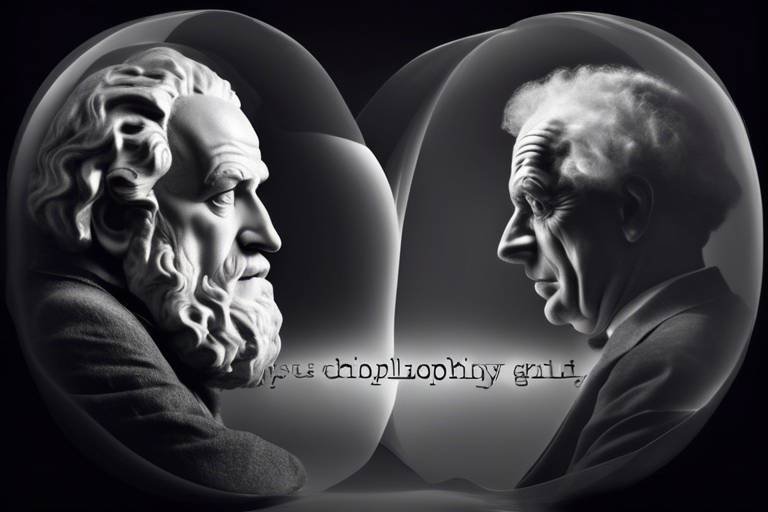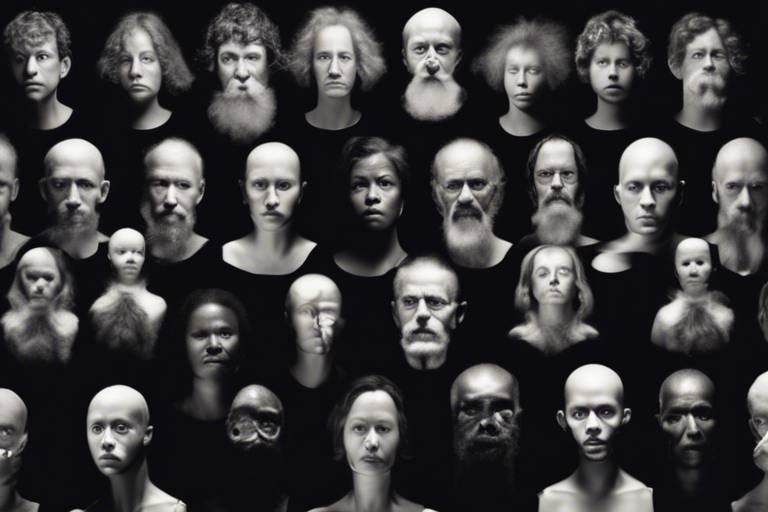Evaluating the Vital Role of Philosophy in Society
Philosophy is often seen as an abstract discipline, tucked away in the dusty corners of academia. However, its influence permeates our everyday lives, shaping our values, beliefs, and the very fabric of society. From the way we perceive justice to our understanding of morality, philosophy acts as a guiding light, illuminating the paths we choose to take. It challenges us to think critically, question the status quo, and engage in meaningful dialogue. In this article, we will explore how philosophy not only molds individual character but also serves as a cornerstone for societal development.
Throughout history, philosophy has been a driving force behind significant cultural and societal transformations. Ancient philosophers like Socrates, Plato, and Aristotle laid the groundwork for Western thought, influencing everything from politics to science. Their ideas on ethics, governance, and human nature continue to resonate today. For instance, the Socratic method, which emphasizes questioning and dialogue, is still used in modern education to encourage critical thinking.
Moreover, Eastern philosophies, such as Confucianism and Buddhism, have also played pivotal roles in shaping societies. They offer alternative perspectives on morality, community, and the self, enriching our understanding of human experiences across different cultures. The interplay between these philosophical traditions has fostered a rich tapestry of thought that informs our contemporary world.
Critical thinking is the bedrock of informed decision-making, and philosophy is its most ardent advocate. By engaging with philosophical principles, individuals sharpen their analytical skills, enabling them to dissect complex problems and arrive at reasoned conclusions. In a world filled with misinformation and polarized opinions, the ability to think critically is more crucial than ever.
Philosophy teaches us to ask the right questions, challenge assumptions, and evaluate arguments rigorously. This process not only enhances personal understanding but also promotes a culture of reasoned discourse within society. When individuals engage in thoughtful discussions, they are more likely to arrive at solutions that are equitable and just.
Integrating philosophy into educational curricula can have profound effects on students' critical thinking abilities. By introducing philosophical concepts early on, educators can cultivate a generation of thinkers who are not only knowledgeable but also capable of navigating the complexities of modern life. Imagine a classroom where students are encouraged to debate ethical dilemmas, explore existential questions, and reflect on their beliefs. This environment fosters intellectual curiosity and empowers students to become active participants in their communities.
One of the most significant contributions of philosophy in education is its ability to promote ethical reasoning. When students are presented with moral dilemmas, they are challenged to consider various perspectives and develop their own ethical frameworks. This not only enhances their decision-making skills but also prepares them to face real-world challenges with integrity. Strategies such as role-playing, group discussions, and case studies can be effective in fostering these ethical discussions in the classroom.
Open dialogue is essential for a healthy educational environment. Philosophy encourages respectful discussions where diverse perspectives are valued. By creating a safe space for students to express their thoughts and ideas, educators can help cultivate empathy and understanding among peers. This practice not only enriches the learning experience but also prepares students to engage with a pluralistic society.
The impact of philosophy extends beyond the classroom and into the realm of politics. Philosophical ideas have significantly shaped political theories and practices throughout history. Thinkers like John Locke and Thomas Hobbes laid the groundwork for modern democracy and governance, sparking debates about the nature of power, rights, and the social contract. These discussions continue to influence contemporary political discourse, guiding our understanding of justice, freedom, and equality.
Philosophy provides essential frameworks for understanding ethics and morality, guiding societal norms and individual behavior. The exploration of ethical theories helps us navigate the complex landscape of moral decision-making. By examining different perspectives, we can better understand the implications of our choices on ourselves and others.
Two prominent ethical theories, utilitarianism and deontology, offer contrasting views on moral decision-making. Utilitarianism, championed by philosophers like Jeremy Bentham and John Stuart Mill, posits that the best action is the one that maximizes overall happiness. In contrast, deontological ethics, associated with Immanuel Kant, emphasizes the importance of duty and adherence to moral rules, regardless of the outcomes. Understanding these theories allows us to grapple with contemporary ethical dilemmas, such as those related to technology, healthcare, and environmental sustainability.
Virtue ethics emphasizes the importance of character and moral virtues in ethical decision-making. Rather than focusing solely on rules or consequences, this approach encourages individuals to cultivate qualities such as honesty, courage, and compassion. By fostering personal integrity, virtue ethics contributes to societal well-being, as individuals strive to act in ways that benefit both themselves and their communities.
- What is the main purpose of philosophy in society? Philosophy encourages critical thinking, ethical reasoning, and open dialogue, which are essential for informed decision-making and societal progress.
- How does philosophy influence education? Integrating philosophy into education enhances students' analytical skills and prepares them to engage thoughtfully with complex issues.
- What are the key ethical theories in philosophy? Major ethical theories include utilitarianism, deontology, and virtue ethics, each offering different perspectives on moral decision-making.

The Historical Significance of Philosophy
Philosophy has been the backbone of human thought for centuries, serving as a guiding light through the fog of ignorance and superstition. From the ancient Greeks to modern thinkers, philosophical inquiry has shaped the very foundations of our societies. It has provided us with the tools to question our beliefs, understand our existence, and navigate the complexities of life. Imagine a world without philosophy—where decisions are made based solely on impulse or tradition. It would be chaotic, to say the least!
Throughout history, key philosophical movements have emerged, each leaving an indelible mark on civilization. For instance, the Stoics taught resilience and virtue, influencing not only personal conduct but also political governance. Their emphasis on reason and self-control has echoed through the ages, impacting leaders and citizens alike. Similarly, the Renaissance brought forth a revival of classical thought, emphasizing humanism and the potential of the individual. This shift paved the way for modern science and democratic ideals.
In the realm of Eastern philosophy, schools of thought such as Confucianism and Buddhism have profoundly influenced social structures and moral codes in Asia. Confucius emphasized the importance of relationships and ethics in governance, shaping societies that value harmony and respect. Meanwhile, Buddhism introduced concepts of suffering and enlightenment, prompting individuals to seek inner peace and compassion. These philosophies not only guided personal behavior but also established societal norms that persist to this day.
To understand the historical significance of philosophy, we can look at some of the major philosophical movements and their impacts:
| Philosophical Movement | Key Ideas | Impact on Society |
|---|---|---|
| Stoicism | Virtue, reason, self-control | Influenced personal ethics and governance |
| Renaissance Humanism | Individual potential, classical learning | Paved the way for modern science and democracy |
| Confucianism | Ethics, relationships, social harmony | Shaped social structures and moral codes in Asia |
| Buddhism | Suffering, enlightenment, compassion | Promoted inner peace and ethical living |
Philosophy's influence extends beyond mere thought; it has been a catalyst for social change and progress. The Enlightenment period, for example, was a time when reason triumphed over tradition, leading to revolutions and the establishment of rights that we hold dear today. Thinkers like John Locke and Jean-Jacques Rousseau challenged the status quo, advocating for individual rights and democratic governance, which laid the groundwork for modern political systems.
In conclusion, the historical significance of philosophy cannot be overstated. It has been a crucial element in shaping human thought, culture, and society. By encouraging critical inquiry and ethical reasoning, philosophy not only enriches our understanding of the world but also empowers us to make informed decisions. As we continue to grapple with complex issues in our modern lives, the teachings of past philosophers remain relevant, reminding us that the quest for knowledge and understanding is an eternal journey.
- What is the main purpose of philosophy?
Philosophy aims to explore fundamental questions about existence, knowledge, values, reason, and reality, helping us to understand our place in the world. - How does philosophy influence modern society?
Philosophy influences modern society by shaping ethical frameworks, guiding political thought, and promoting critical thinking skills. - Can philosophy be applied in everyday life?
Absolutely! Philosophy encourages us to reflect on our values, make informed decisions, and engage in meaningful discussions with others.

Philosophy and Critical Thinking
In a world overflowing with information, the ability to think critically is more crucial than ever. Critical thinking is not just about absorbing facts; it’s about examining, analyzing, and questioning the information we encounter. This is where philosophy steps in, acting as a guiding light that illuminates the path to reasoned thought. By encouraging individuals to engage with complex ideas and challenge their own assumptions, philosophy cultivates a mindset that is essential for informed decision-making. Imagine trying to navigate a dense forest without a map—philosophy provides that map, helping us to find our way through the tangled underbrush of opinions and beliefs.
Philosophical principles teach us to dissect arguments, identify biases, and evaluate evidence. This process is akin to being a detective, piecing together clues to solve a mystery. For instance, when faced with a controversial issue, a critical thinker will not simply accept the prevailing opinion; instead, they will ask questions like, “What evidence supports this claim?” or “Are there alternative viewpoints?” This kind of inquiry fosters a culture of reasoned discourse, where ideas can be debated and refined rather than merely accepted.
Moreover, philosophy encourages us to consider the implications of our thoughts and actions. It prompts us to ask deeper questions about our values and beliefs. For example, when discussing societal issues such as climate change or social justice, critical thinking allows us to explore not just the facts, but the ethical dimensions of these topics. We might ask ourselves, “What responsibilities do we have to future generations?” or “How can we ensure fairness in our policies?” In this way, philosophy enriches our understanding and helps us navigate the moral landscape of contemporary issues.
One of the most effective ways to integrate philosophy into critical thinking is through education. Schools that incorporate philosophical discussions into their curricula empower students to think independently and develop their analytical skills. When students engage in debates about philosophical questions, they learn to articulate their thoughts clearly and respectfully consider opposing viewpoints. This practice not only enhances their critical thinking abilities but also prepares them for civic engagement in a diverse society.
In summary, philosophy and critical thinking are intertwined in a dance of inquiry and understanding. By embracing philosophical principles, we can sharpen our analytical skills, challenge our beliefs, and foster a culture of open dialogue. As we navigate the complexities of modern life, the ability to think critically will serve as an invaluable tool, guiding us toward more informed and ethical decisions.
- What is the relationship between philosophy and critical thinking? Philosophy provides the tools and frameworks necessary for critical thinking, encouraging individuals to analyze and question information rather than simply accept it.
- How can philosophy improve decision-making skills? By promoting analytical thinking and ethical reasoning, philosophy helps individuals evaluate the consequences of their decisions and consider multiple perspectives.
- Is philosophy relevant in today's society? Absolutely! Philosophy is essential for navigating complex social issues, fostering ethical discussions, and promoting informed citizenship.

Philosophy in Education
Integrating philosophy into educational curricula is like adding a secret ingredient to a recipe—it enhances the overall flavor and experience of learning. Just imagine a classroom where students are not merely passive recipients of information, but active participants in a vibrant dialogue about life’s biggest questions. Philosophy encourages students to explore the depths of their thoughts and beliefs, fostering a culture of inquiry that is essential for personal and intellectual growth.
One of the most significant benefits of teaching philosophical concepts in schools is the development of critical thinking skills. Students learn to analyze arguments, recognize biases, and evaluate evidence. This skill set is invaluable not just in academics, but in everyday decision-making. For instance, when faced with a moral dilemma, a student trained in philosophical reasoning is more likely to weigh the implications of their choices thoughtfully, rather than reacting impulsively.
Moreover, philosophy promotes open dialogue in educational settings. Imagine a classroom where students feel safe to express their thoughts and challenge each other's ideas respectfully. This environment not only enhances learning but also prepares students for the complexities of real-world interactions. By engaging in discussions about diverse perspectives, students develop empathy and understanding, which are crucial in our increasingly globalized society.
To illustrate the impact of philosophy in education, consider the following table that summarizes the key benefits:
| Benefit | Description |
|---|---|
| Critical Thinking | Encourages analysis, evaluation, and reasoning in decision-making. |
| Open Dialogue | Fosters respectful discussions and diverse viewpoints. |
| Ethical Reasoning | Challenges students to consider moral dilemmas and their implications. |
| Personal Development | Promotes self-reflection and personal growth through philosophical inquiry. |
Incorporating philosophy into education is not just about teaching students to think; it's about teaching them to think deeply and critically. It empowers them to question the status quo and engage with the world around them in a meaningful way. When students are encouraged to explore their own beliefs and the beliefs of others, they become more informed citizens who can contribute thoughtfully to society.
In conclusion, the role of philosophy in education is vital. It enriches the learning experience, equips students with essential skills, and prepares them for the complexities of life. By fostering an environment of inquiry and dialogue, we can cultivate a generation of thinkers who are not only knowledgeable but also wise.
- Why is philosophy important in education? Philosophy encourages critical thinking, ethical reasoning, and open dialogue, which are essential for personal and intellectual development.
- How can philosophy be integrated into the curriculum? Teachers can incorporate philosophical discussions into various subjects, encouraging students to explore fundamental questions related to the material.
- What are the benefits of teaching philosophy to young students? Young students develop analytical skills, learn to articulate their thoughts, and gain a deeper understanding of themselves and the world around them.

Promoting Ethical Reasoning
In today's rapidly changing world, promoting ethical reasoning is more crucial than ever. Philosophy serves as a guiding light in navigating the complex moral landscapes we encounter daily. By engaging with philosophical concepts, students and individuals are challenged to confront moral dilemmas head-on, fostering a deeper understanding of right and wrong. This process not only enhances critical thinking skills but also cultivates a sense of responsibility towards others and society as a whole.
One effective strategy for fostering ethical discussions in educational settings is through the use of real-life scenarios that provoke thought and inspire debate. For instance, educators can present students with case studies that involve ethical dilemmas, encouraging them to weigh differing perspectives and consider the implications of their choices. This method not only makes the learning experience interactive but also helps students develop their own moral compass.
Furthermore, creating a safe space for open dialogue is essential in promoting ethical reasoning. When students feel comfortable expressing their thoughts and opinions, they are more likely to engage in meaningful conversations about ethics. This can be achieved by establishing ground rules that emphasize respect and understanding, allowing diverse viewpoints to flourish. By fostering an environment where differing opinions are valued, students can learn to appreciate the complexity of ethical issues, ultimately leading to more informed and compassionate individuals.
Incorporating philosophy into discussions about ethics also encourages students to think critically about their values and assumptions. It prompts them to ask questions such as:
- What does it mean to act ethically?
- How do cultural differences influence our understanding of morality?
- Can ethical decisions be made without considering the consequences?
By grappling with these questions, individuals develop the ability to analyze situations from multiple angles, which is an invaluable skill in both personal and professional contexts. The ability to engage in ethical reasoning not only prepares students for the challenges they will face in their lives but also empowers them to become active participants in their communities.
Ultimately, promoting ethical reasoning through philosophy equips individuals with the tools they need to navigate the moral complexities of life. It fosters a culture of respect, understanding, and critical thinking that can lead to positive societal change. As we continue to embrace the teachings of philosophy, we pave the way for a future where ethical considerations are at the forefront of our decisions.
- Why is ethical reasoning important in education?
Ethical reasoning helps students develop critical thinking skills and prepares them to make informed decisions in their personal and professional lives. - How can philosophy be integrated into the curriculum?
Philosophy can be integrated through discussions, case studies, and encouraging students to explore ethical dilemmas in various subjects. - What role does open dialogue play in ethical reasoning?
Open dialogue creates a safe environment for students to express their thoughts, fostering respect and understanding of diverse perspectives.

Encouraging Open Dialogue
In today's fast-paced world, where opinions fly around like confetti at a parade, in educational settings is more critical than ever. Imagine a classroom where students feel free to express their thoughts, challenge ideas, and engage in respectful debates. This environment not only enhances learning but also prepares students for the complexities of real-world interactions. Open dialogue fosters a culture of understanding and respect, allowing diverse perspectives to flourish.
One of the most effective ways to cultivate this environment is by implementing structured discussions. For instance, teachers can introduce a topic and then facilitate a roundtable discussion where every student has the opportunity to share their views. This method not only democratizes the conversation but also encourages students to listen actively to their peers. Think of it as a symphony where each instrument contributes to a harmonious whole; every voice matters. By valuing each contribution, students learn the importance of differing opinions and the art of respectful disagreement.
Moreover, integrating philosophical texts into discussions can serve as a catalyst for deeper conversations. When students analyze classic philosophical arguments, they are not just learning about history; they are engaging with ideas that have shaped human thought. This can lead to rich discussions about ethics, morality, and societal norms. For example, when discussing John Stuart Mill's utilitarianism, students might debate the implications of sacrificing one for the greater good, prompting them to consider the complexities of ethical decision-making.
To further enhance open dialogue, educators can establish ground rules that promote respect and inclusivity. These rules might include:
- Listen actively and without interruption.
- Respect differing opinions, even if you disagree.
- Use "I" statements to express personal views.
By setting these guidelines, teachers create a safe space where students can explore challenging topics without fear of judgment. This approach not only enriches their learning experience but also builds empathy and critical thinking skills, essential tools for navigating the complexities of modern society.
In conclusion, encouraging open dialogue in educational settings is a vital component of fostering critical thinking and ethical reasoning. By creating an environment where students feel empowered to share their thoughts, challenge norms, and engage with diverse perspectives, we prepare them to become thoughtful, informed citizens who can navigate the complexities of the world with grace and understanding.
Q: Why is open dialogue important in education?
A: Open dialogue fosters critical thinking, encourages respect for diverse viewpoints, and prepares students for real-world interactions.
Q: How can teachers facilitate open dialogue?
A: Teachers can facilitate open dialogue by implementing structured discussions, introducing philosophical texts, and establishing ground rules for respectful communication.
Q: What role does philosophy play in promoting open dialogue?
A: Philosophy provides a framework for exploring complex ideas, encouraging students to engage in thoughtful discussions about ethics, morality, and societal norms.

Philosophy's Influence on Politics
Philosophy and politics are intertwined like threads in a tapestry, each influencing and shaping the other over centuries. The profound ideas proposed by philosophers have not only sparked revolutions but have also laid the groundwork for modern governance. Think about it: how often do we hear politicians referencing philosophical concepts to justify their policies? From Plato’s vision of the ideal state to John Locke’s theories on natural rights, philosophical ideas have been pivotal in crafting the political landscapes we navigate today.
One of the most significant influences of philosophy on politics is the establishment of political ideologies. For instance, the Enlightenment, a period rich with philosophical inquiry, birthed concepts of liberty, equality, and fraternity, which became the rallying cries for democratic movements worldwide. Philosophers like Rousseau and Hobbes debated the nature of human beings and the social contract, fundamentally altering how we perceive authority and governance. Their discussions led to the idea that governments derive their legitimacy from the consent of the governed, a principle that remains central to democratic societies.
Furthermore, philosophy challenges us to question the status quo. It encourages critical discourse about power dynamics and the ethical implications of governance. When we consider the role of civic engagement, we realize that philosophical inquiry invites citizens to participate actively in their political systems. This active participation is crucial because it fosters a more informed electorate capable of making decisions based on reasoned arguments rather than mere emotional responses.
To illustrate this, let’s take a look at how different philosophical movements have impacted political thought:
| Philosophical Movement | Key Thinkers | Political Impact |
|---|---|---|
| Utilitarianism | Jeremy Bentham, John Stuart Mill | Focus on the greatest good for the greatest number; influential in social reforms. |
| Libertarianism | John Locke, Friedrich Hayek | Emphasis on individual rights and free markets; influenced modern conservative policies. |
| Marxism | Karl Marx, Friedrich Engels | Critique of capitalism; inspired socialist movements and revolutions. |
These movements showcase how philosophical thought can lead to tangible political actions and ideologies. The debates surrounding governance, rights, and ethics continue to evolve, yet they remain rooted in philosophical inquiry. As we navigate complex political issues today, such as climate change, social justice, and economic inequality, the relevance of philosophical frameworks becomes even more pronounced. They provide us with the tools to analyze these dilemmas critically and ethically.
In conclusion, the influence of philosophy on politics is undeniable. It serves as a foundation for our understanding of justice, governance, and the role of individuals within society. By engaging with philosophical ideas, we not only enrich our political discourse but also empower ourselves as active participants in shaping the future of our communities.
- How has philosophy shaped modern political systems? Philosophy has provided the foundational ideas that underpin modern democratic systems, including concepts of rights and governance.
- What role do philosophers play in politics today? Philosophers contribute to political discourse by offering frameworks for understanding complex issues and encouraging critical thinking.
- Can philosophy help solve political conflicts? Yes, philosophical inquiry promotes dialogue and understanding, which are essential for resolving conflicts and fostering cooperation.

Ethics and Morality in Society
Ethics and morality serve as the backbone of any society, guiding individuals in their actions and decisions. They provide a framework for what is considered right and wrong, shaping our interactions with one another. But have you ever stopped to wonder where these moral guidelines come from? Are they universal truths, or are they shaped by cultural contexts? Philosophy plays a pivotal role in answering these questions, offering various theories that help us navigate the complex landscape of ethical decision-making.
At its core, philosophy provides us with the tools to critically analyze our beliefs about morality. It encourages us to ask tough questions and challenge societal norms. For instance, consider the difference between ethics and morality. While often used interchangeably, ethics typically refers to the systematic study of what is right and wrong, whereas morality pertains to the actual practices and beliefs held by individuals and cultures. This distinction is crucial because it allows us to understand that while ethical theories can be universal, moral practices may vary significantly from one culture to another.
Philosophy offers several frameworks for understanding ethics, each with its unique perspective. For example, utilitarianism suggests that the best action is the one that maximizes overall happiness. In contrast, deontology emphasizes the importance of following moral rules, regardless of the consequences. These theories are not just academic; they have real-world implications. They guide policymakers, influence legal systems, and shape public discourse on issues ranging from healthcare to environmental responsibility.
To illustrate the relevance of these ethical theories, let’s consider a few contemporary dilemmas:
- Should healthcare be a universal right, or should it be based on individual ability to pay?
- Is it ethical to prioritize economic growth over environmental conservation?
- How do we balance national security with individual privacy rights?
Each of these questions can be analyzed through the lenses of utilitarianism and deontology, leading to different conclusions and fostering rich discussions. This is where philosophy shines—by encouraging us to engage in thoughtful discourse about our values and the implications of our choices.
Moreover, philosophy's influence extends beyond mere theoretical discussions. It impacts our daily lives, shaping our character and guiding our actions. For instance, the concept of virtue ethics focuses on the development of moral character rather than strict adherence to rules. This approach emphasizes the importance of virtues like honesty, courage, and compassion, suggesting that by cultivating these traits, we can contribute positively to society.
In essence, philosophy acts as a compass for navigating the murky waters of ethics and morality. It challenges us to think critically, encourages open dialogue, and fosters a deeper understanding of what it means to live a good life. As we confront the ethical challenges of the modern world, the insights gained from philosophical inquiry become increasingly valuable. They not only help shape our individual moral compasses but also contribute to the collective ethical standards of society.
- What is the difference between ethics and morality? Ethics is the systematic study of what is right and wrong, while morality refers to the actual beliefs and practices of individuals and cultures.
- Why is philosophy important for understanding ethics? Philosophy provides the critical thinking tools necessary to analyze and question our beliefs about morality, helping us navigate complex ethical dilemmas.
- How do ethical theories influence real-world decisions? Ethical theories guide policymakers and shape public discourse, impacting decisions on issues such as healthcare, environmental policies, and individual rights.

Utilitarianism vs. Deontology
When it comes to ethical decision-making, two of the most prominent theories that often come into play are utilitarianism and deontology. These frameworks provide different lenses through which we can evaluate our actions and their consequences, and understanding their distinctions is crucial for navigating complex moral landscapes. Utilitarianism, championed by philosophers like Jeremy Bentham and John Stuart Mill, posits that the rightness or wrongness of an action is determined by its outcomes. In other words, the best action is the one that maximizes overall happiness or utility. This principle is often summarized by the phrase: "the greatest good for the greatest number."
On the flip side, we have deontology, primarily associated with the philosopher Immanuel Kant. This ethical theory argues that actions are morally right or wrong based on their adherence to rules or duties, rather than their consequences. For deontologists, certain actions are inherently right or wrong, regardless of the outcomes they produce. This perspective emphasizes the importance of intention and the moral law, suggesting that we have an obligation to act in accordance with universal moral principles.
To illustrate the differences between these two ethical frameworks, consider the following scenario: Imagine you are faced with a situation where you can either divert a runaway trolley onto a track where it will kill one person instead of five. A utilitarian approach would advocate for diverting the trolley, as it minimizes the overall loss of life and maximizes happiness for the larger group. However, a deontologist might argue against this action, asserting that it is morally wrong to actively cause harm to an individual, even if it results in a greater good. This fundamental clash between the two theories highlights the complexity of ethical decision-making.
Both theories have their strengths and weaknesses. Utilitarianism is often praised for its practical approach to ethics, as it focuses on real-world consequences and encourages a forward-thinking perspective. However, critics argue that it can justify morally questionable actions if they lead to a perceived greater good. On the other hand, deontology provides a strong framework for upholding moral duties and respecting individual rights, but it can sometimes lead to rigid conclusions that ignore the nuances of specific situations.
In real-world applications, these theories often intersect and influence each other. For instance, policymakers may use utilitarian principles when crafting laws aimed at maximizing societal welfare, while also considering deontological principles that safeguard individual rights. The ongoing debate between these two ethical frameworks continues to shape discussions in various fields, including law, politics, and personal ethics.
- What is the main difference between utilitarianism and deontology?
Utilitarianism focuses on the consequences of actions to determine their morality, while deontology emphasizes the adherence to moral rules and duties regardless of the outcomes. - Can utilitarianism justify harmful actions?
Yes, utilitarianism can sometimes justify actions that may be harmful if they lead to a greater overall benefit, which is a significant criticism of the theory. - Is it possible to combine both ethical theories?
Many philosophers believe that a hybrid approach can be beneficial, incorporating the strengths of both utilitarianism and deontology to navigate complex moral dilemmas.

The Role of Virtue Ethics
When we think about ethics, many of us might immediately jump to rules and consequences, but virtue ethics invites us to look deeper, focusing on the character of the moral agent rather than just the actions themselves. This fascinating approach emphasizes the importance of moral virtues and personal integrity in guiding our decisions and actions. Imagine a world where individuals are not only concerned about what is right or wrong, but are also striving to be better people. This is the essence of virtue ethics, which can be traced back to ancient philosophers like Aristotle.
Aristotle believed that virtues are habits that enable us to act according to reason and achieve our highest potential. He famously stated, “We are what we repeatedly do. Excellence, then, is not an act, but a habit.” This perspective shifts the focus from merely following rules to cultivating a virtuous character. In today's fast-paced society, where ethical dilemmas are often complex and multifaceted, the role of virtue ethics becomes even more crucial. It encourages individuals to develop qualities such as courage, honesty, and compassion, which can guide them through challenging situations.
Furthermore, virtue ethics has significant implications for societal well-being. When individuals prioritize personal virtues, they contribute to a culture that values integrity and responsibility. This creates a ripple effect, fostering an environment where ethical behavior is not just expected but celebrated. For instance, consider the impact of community leaders who embody virtues like fairness and empathy. Their actions inspire others to follow suit, leading to a more harmonious and just society.
To illustrate the importance of virtue ethics, let’s consider a few key virtues and their societal implications:
| Virtue | Description | Societal Impact |
|---|---|---|
| Courage | The ability to confront fear or adversity. | Encourages individuals to stand up for justice and challenge wrongdoing. |
| Honesty | Being truthful and transparent in one’s actions. | Builds trust within communities and fosters open communication. |
| Compassion | Empathy and concern for the suffering of others. | Promotes social welfare and drives charitable actions. |
In the realm of personal development, virtue ethics also plays a pivotal role. By nurturing virtues, individuals can achieve a sense of fulfillment and purpose. It’s like tending to a garden; the more care and attention you give to your virtues, the more they blossom into positive traits that enhance your life and the lives of those around you. This ongoing journey of self-improvement not only benefits the individual but also enriches the community as a whole.
In conclusion, the role of virtue ethics in society cannot be overstated. It provides a framework that encourages individuals to cultivate their character, leading to ethical decision-making that transcends mere rule-following. By focusing on virtues, we can create a more compassionate, just, and harmonious world. So, the next time you face a moral dilemma, ask yourself: What kind of person do I want to be? This simple question can guide you toward making decisions that reflect your highest values.
- What is virtue ethics? - Virtue ethics is an ethical theory that emphasizes the role of character and virtue in moral philosophy rather than rules or consequences.
- How does virtue ethics differ from other ethical theories? - Unlike utilitarianism, which focuses on the outcomes of actions, or deontology, which emphasizes rules, virtue ethics centers on the individual’s character and the cultivation of virtues.
- Can virtue ethics be applied in modern society? - Absolutely! Virtue ethics is relevant today as it encourages personal development and ethical behavior, fostering a more compassionate and just society.
Frequently Asked Questions
- What is the importance of philosophy in society?
Philosophy plays a vital role in shaping societal values and norms. It encourages critical thinking, which is essential for informed decision-making. By examining fundamental questions about existence, knowledge, and ethics, philosophy helps individuals and communities navigate complex moral dilemmas and societal challenges.
- How does philosophy influence critical thinking?
Philosophy promotes critical thinking by teaching individuals to analyze arguments, identify biases, and evaluate evidence. This analytical approach fosters reasoned discourse, enabling people to engage thoughtfully with diverse perspectives and make well-informed decisions in both personal and public spheres.
- Why should philosophy be integrated into education?
Integrating philosophy into education enhances students' critical thinking skills and encourages them to explore ethical reasoning. By engaging with philosophical concepts, students learn to approach problems from various angles, fostering open dialogue and respect for differing opinions, which are crucial for a healthy learning environment.
- What are the main ethical theories discussed in philosophy?
Two prominent ethical theories are utilitarianism, which focuses on the greatest good for the greatest number, and deontology, which emphasizes duty and rules. Additionally, virtue ethics highlights the importance of character and moral virtues, shaping how individuals approach ethical decision-making in their lives.
- How does philosophy contribute to personal development?
Philosophy encourages self-reflection and introspection, helping individuals understand their values and beliefs. This process of self-discovery fosters personal integrity and promotes a sense of responsibility toward oneself and society, ultimately leading to a more fulfilling life.
- In what ways has philosophy influenced politics?
Philosophical ideas have profoundly shaped political theories and practices throughout history. Concepts of justice, rights, and governance stem from philosophical discourse, influencing how societies structure their governments and engage with issues of power and ethics.



















